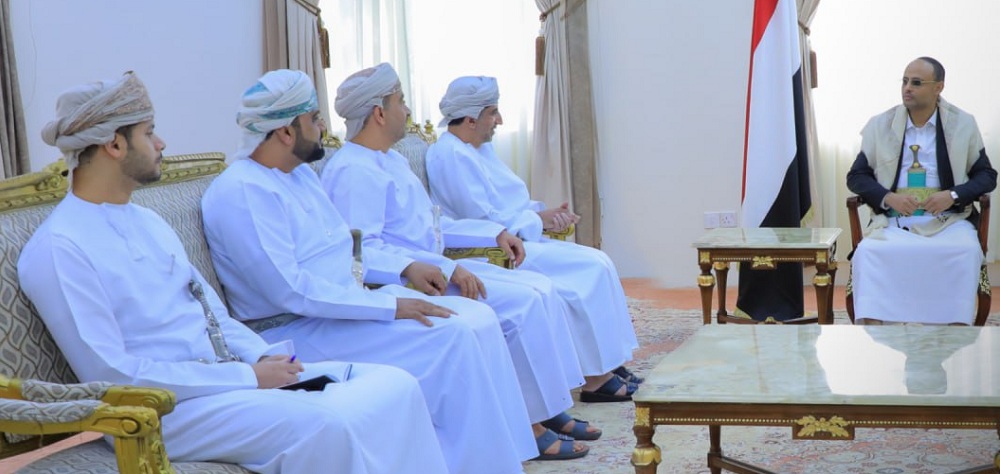This was Omani delegation's second visit to Sana’a to help revive the peace talks which have been on hold after Ansarullah, a leading actor in Yemen’s resistance to the Saudi-led aggression and the force in control of the capital, protested at the Saudi treacherous lack of commitment to terms of last year ceasefire deal that include allowing improvement of humanitarian situation and lifting the inhumane blockade on the already-impoverished country. The failure to reach a deal has brought shadow of clashes back to the battlegrounds.
No exact details of the possible proposals that the Omani delegation has brought to Sana’a have been leaked to media, but Yemen’s Saba news agency reported that the Omanis met with the representatives of Ansarullah, led by chief negotiator Mohammad Abdul Salam, to “discuss the latest developments”.
“The visit of the Omani delegation is a continuation of the recent meetings and after that we sent many messages,” Abdul Salam was quoted as saying.
Mahdi al-Mashat, head of Yemen’s Supreme Political Council, pointed to the humanitarian case as the “first step for peace” in a meeting with Omani diplomats.
Omani representatives were in Sana’a in December to help revive peace talks with the aim of ending the war, but the Saudi side has been too stubborn to accept the minimal and completely legitimate demands of the Yemenis, which included improving the human rights situation, easing the medical, food, and fuel sanctions, allowing flights from Sana’a airport, the completely ending Arab coalition attacks, and paying employees’ salaries by the Central Bank of Yemen which was transferred to Aden in September 2016.
Riyadh beaten by fear
After the decline to extend the ceasefire, which started from April and continued to mid-September last year, a no-war-no-peace situation has dominated the field equations of the Yemeni crisis. According to Ansarullah, this situation was unilaterally in favor of the Saudi side, because both sanctions remained in place against Yemen and the shadow of the threat of missile and drone attacks on the oil facilities and cities of the Arab kingdom was removed, with Riyadh easily and safely exporting its oil.
In this situation, Ansarullah designed step-by-step operations, starting with attacks on oil terminals including Al-Dhaba in Mukalla in southern Yemen and making it impossible for Saudi-backed Aden administration to export oil. And in recent days, the movement ramped up its threats to start a new wave of “deterrence operations” deep in Saudi Arabia and the UAE.
Earlier this month, the Sana’a-based Ansarullah-led Supreme Political Council (SPC) announced that the armed forces were “fully prepared to deal with any threat to Yemen’s sovereignty.”
In a statement released at a high-level meeting, the SPC warned of the dangers of the current policy of ‘no-peace-no-war implemented by the Saudi-led coalition, adding: “This situation cannot continue forever.”
Therefore, sequence of the unannounced visit of the Omani delegation to Sana’a with the wave of threats by Ansarullah shows that the Saudi Arabian authorities have taken Yemen’s warnings seriously and, fearing change of equations on the ground that could bring about new round of Yemeni missile and drone strikes, they have once again sent Omanis for mediation.
No doubt, the Saudi policy of buying time to continue their non-commitment to terms of the agreement has failed and Riyadh can no longer stick to this trick to provide security umbrella for itself, something meaning that 2023 would be the year of full transformation for Yemen war status. Aware of this reality, the Saudis seek to play as peace advocates, but certainly there is a distance between Riyadh and Sana’a’s expectations from a favorable peace.
UN and marginal actors off the negotiations
New round of ceasefire talks saw a noteworthy development: Replacement of UN special envoy with Omani representatives. Definitely, the unprincipled and unbalanced positions of the UN representation during the past years of crisis have created the perception among Yemenis that the UN has played the role of representative of the plans and goals of the hostile Arab coalition and its backer the US in the negotiations, and therefore expecting a biased role that cares about Yemeni national interests is a futile expectation. Frustrating its essential principles, the UN has failed even to force the Saudi side to respect the rights of civilians in the war to prevent the continuation of the humanitarian crisis, but it has continuously condemned Yemen’s legitimate and deterrent military power utilized against the aggressors. Reports suggested that the main reason for the postponement of UN special envoy Hans Grundberg’s visit to Yemen was that Sana’a did not welcome him. However, Omani Foreign Minister Sayyid Badr Albusaidi met with him in Muscat a couple of days before Sana’a visit.
With the UN driven out of negotiations and given a
secondary role, ineffective actors like Aden administration are also
marginalized and Ansarullah is directly engaging Saudi Arabia as the
main aggression force.
/129

